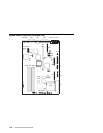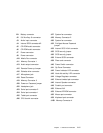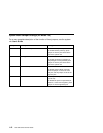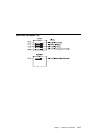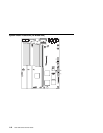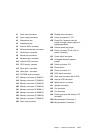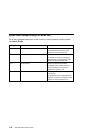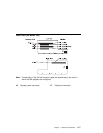
SCSI Bus Termination
The Model 140 and Model 240 have a fast/wide SCSI-2 bus which can support
internal and external SCSI devices. However, each controller on these SCSI busses
must have a unique SCSI id, and the SCSI busses must be properly terminated both
internally and externally (if external devices are used) to ensure SCSI signal integrity.
For directions on setting the SCSI id on each device, consult the documentation for
that device, as well as the
Adapters, Devices, and Cable Information for Multiple Bus
Systems
.
Model 140 Internal SCSI Bus Termination
The Model 140 internal SCSI chain must be terminated by the last drive in the chain,
which must be configured as a self-terminating drive by setting jumpers on the drive.
Please consult the documentation that came with your SCSI device.
Note: Only the last drive in each SCSI chain should be configured as
self-terminating.
External SCSI chains must be terminated by a separate SCSI terminator.
Power Cables
To avoid electrical shock, a power cable with a grounded attachment plug is
provided. Use only properly grounded outlets.
Power cables used in the United States and Canada are listed by Underwriter's
Laboratories (UL) and certified by the Canadian Standards Association (CSA).
These power cords consist of:
Electrical cables, Type SVT or SJT.
Attachment plugs complying with National Electrical Manufacturers Association
(NEMA) 5-15P. That is:
"For 115 V operation, use a UL listed cable set consisting of a minimum 18 AWG,
Type SVT or SJT three-conductor cord a maximum of 15 feet in length and a parallel
blade, grounding type attachment plug rated at 15 A, 125 V."
"For 230 V operation in the United States use a UL listed cable set consisting of a
minimum 18 AWG, Type SVT or SJT three-conductor cable a maximum of 15 feet in
length, and a tandem blade, grounding type attachment plug rated at 15 A, 250 V."
Appliance couplers complying with International Electrotechnical Commission
(IEC) Standard 320, Sheet C13.
1-18 7043 43P Series Service Guide



